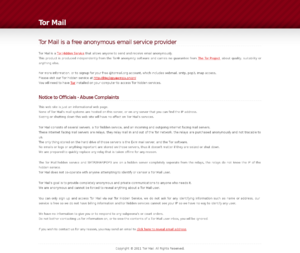Tor Mail
|
Screenshot of Tor Mail main page in April 2013 | |
Type of site | Webmail |
|---|---|
| Available in | English |
| Slogan(s) | Free Anonymous Email |
| Website |
|
| Commercial | No |
| Registration | Required |
| Users | unknown |
| Current status | Offline (as of 10 August 2013) |
Tor Mail is a former Tor hidden service that went offline in August 2013 after an FBI raid on Freedom Hosting. The service allowed users to send and receive email anonymously, to email addresses inside and outside the Tor network.
Offline
A message appeared on the Tor Mail main page in early August 2013, saying "Down for Maintenance Sorry, This server is currently offline for maintenance. Please try again in a few hours." Since August 2013, the service has been unavailable. The disappearance of Tor Mail has been linked to the arrest on child pornography charges of the alleged operator of Freedom Hosting, which hosted a large number of .onion sites.[1] In September 2013, the FBI admitted in a court filing in Dublin that it had taken down Freedom Hosting.[2]
JavaScript attack
Details emerged of a zero-day JavaScript attack, which was injected into the Tor Browser Bundle based on Firefox ESR 17 if JavaScript was enabled as it was by default. JavaScript was turned off by default in updated versions of Tor Browser Bundle. However, this was used during the takedown, which was exploited to send users' IP addresses and Windows computer names to a server in Virginia.[2][3] In January 2014 it was confirmed that FBI has access to Tor Mail servers.[4]
History
Tor Mail provided web mail access with two webmail applications to choose from, one fully functional ajax-based, and one simple client which required no javascript or cookies. The user could also access mail via SMTP, POP3 or IMAP with an email client. The user signed up and accessed Tor Mail via the Tor hidden service and needed to have Tor software installed on a computer to access Tor hidden services. Users were not required to provide any identifying information such as their name or address.
Tor Mail's goal was to provide completely anonymous and private communications to anyone who needed it.[5] The service providers said that they were anonymous and could not be forced to reveal anything about a Tor Mail user. They also said that the service did not cooperate with anyone attempting to identify or censor a Tor Mail user.
Tor Mail's service consisted of several servers, the hidden service, and an incoming and outgoing internet facing mail servers. The site's operators said that the only data stored on the hard drive of those servers was the Exim mail server and the Tor software. "No emails, logs or personal data were stored on those servers, thus it doesn't matter if they are seized or shut down." They claimed to be prepared to quickly replace any relay that was taken offline. The service and SMTP/IMAP/POP3 were on a hidden server completely separate from the relays. The relays did not know the IP address of the hidden service.
In January 2016, it was claimed that innocent TorMail users may have also been hacked by the FBI.[6]
See also
References
- ↑ "Freedom Hosting arrest and takedown linked to Tor privacy compromise". August 5, 2013. Retrieved August 11, 2013.
- 1 2 Poulsen, Kevin. "FBI Admits It Controlled Tor Servers Behind Mass Malware Attack.". Wired.com. Retrieved 2013-12-22.
- ↑ "FBI Malware Analysis". Gareth Owen.
- ↑ Poulsen, Kevin (2013-07-22). "If You Used This Secure Webmail Site, the FBI Has Your Inbox | Threat Level". Wired.com. Retrieved 2014-01-28.
- ↑ "Notice to Officials - Abuse Complaints".
- ↑ Cox, Joseph (21 January 2016). "FBI May Have Hacked Innocent TorMail Users". Retrieved 24 January 2016.
